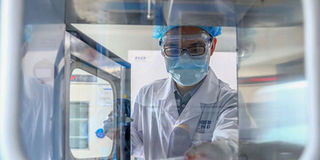Africa must be part of vaccine trials

A staff member takes out samples of the Covid-19 inactivated vaccine at a vaccine production plant of China National Pharmaceutical Group in Beijing, capital of China, April 11, 2020. PHOTO | ZHANG YUWEI | AFP
What you need to know:
- On side-effects, there are risks associated with any clinical trial, but they are minimised as much as possible by testing them on laboratory animals.
- The trials should be thoroughly vetted and closely monitored post-approval to ensure they are conducted to the highest ethical and scientific standards possible.
First was a video clip by French scientists proposing that an African country would be most ideal for Covid-19 vaccine clinical trials.
Then a BBC medical correspondent said on TV that Oxford University was considering testing a vaccine in Kenya.
Condemnation followed, including that Africans should not be used as “guinea pigs”; the trials should take place in Europe and the US, which have more Covid-19 cases than Africa; the West is taking advantage of Africa’s weak regulatory systems; the trials are too risky for Africans, and foreigners should not conduct such trials in Africa.
Then social media stories that a Covid-19 vaccine owned by Bill Gates is being secretly tested in Africa surfaced, thus throwing a spin of a conspiracy theory against the continent.
Now let us examine the veracity of these claims. First the “guinea pigs” tag. Before they are registered and stocked by pharmacies for public use, all medicines and vaccines go through clinical trials.
These largely took place in the West as the resource-limited African countries had no expertise or the required infrastructure, but nowadays they take place worldwide.
BUILD CAPACITY
Interestingly, this terminology, and resistance, does not seem to apply when the trials are conducted in the West. Clinical trials for malaria and Ebola vaccines were first conducted in Europe, yet the primary beneficiaries were in Africa.
Secondly, on Africa having fewer Covid-19 cases. Some medicines and vaccines may not work well in different populations, for reasons such as genetic make-up, nutritional status and concurrent infections uncommon in other set-ups.
Atenolol, an anti-hypertension drug, works very well among Caucasians, but not Africans. There would be no guarantee without trying it on them.
Thirdly, the claim of weak regulatory systems. Although this could have been true of many parts of Africa years ago, most African countries now have robust approval processes for conducting clinical trials.
The World Health Organisation (WHO) and such initiatives as Africa Vaccine Evaluation Forum (Avaref) have helped to build capacity of African countries to evaluate proposals for vaccine clinical trials.
In Kenya, vaccine clinical trials go through a very rigorous approval process that includes first review and approval by an independent ethics review committee comprising researchers, medical experts, a lawyer and lay persons.
The committees are accredited by the National Bioethics Committee of the National Commission for Science and Technology (Nacosti), of the Ministry of Education.
MINIMISED RISKS
The researchers must then submit the proposal for review and approval by the Pharmacy and Poisons Board (PPB), the national regulator for medicines, vaccines and devices.
PPB’s Expert Committee on Clinical Trials is composed of researchers well-versed on clinical trials. It is only after its approval that the researchers can import the vaccine and begin the trial. The process takes, on average, up to six months.
Fourthly, the notion that the trials are risky and could infect participants with Covid-19. On the second concern, the vaccines being tested are made from substances that resemble the disease-causing virus, not the virus.
The body produces immune responses to fight the virus; when it gets into contact with the virus, it is well armed. The mannequin used for modelling clothes, no matter how much it resembles a human being, can never become one!
On side-effects, there are risks associated with any clinical trial, but they are minimised as much as possible by testing them on laboratory animals.
Only vaccines found to be safe are moved to clinical trials in humans, where safety is very closely monitored and side-effects promptly treated.
Fifthly, on foreigners conducting trials in Africa. That may have been possible before but not anymore. The trials require collaboration of foreign and local scientists.
FALLACIES
Finally, with regard to the “Gates vaccine” stories, I see two fallacies. The clinical trial registries — www.clinictrial.gov and www.pactr.org — show 11 active Covid-19 vaccine trials in the Netherlands, UK, US, China, Austria and Australia. None is sponsored by the Gates.
Africa has been participating in the malaria, HIV, Ebola, TB and other vaccine clinical trials. It cannot be a bystander in the response to the pandemic and only hope to benefit from the global effort.
However, the trials should be thoroughly vetted and closely monitored post-approval to ensure they are conducted to the highest ethical and scientific standards possible.
Prof Jaoko, director of Kenya Aids Vaccine Initiative (Kavi) Institute of Clinical Research, teaches medical microbiology at the University of Nairobi and is an extraordinary professor at Stellenbosch University. [email protected].




